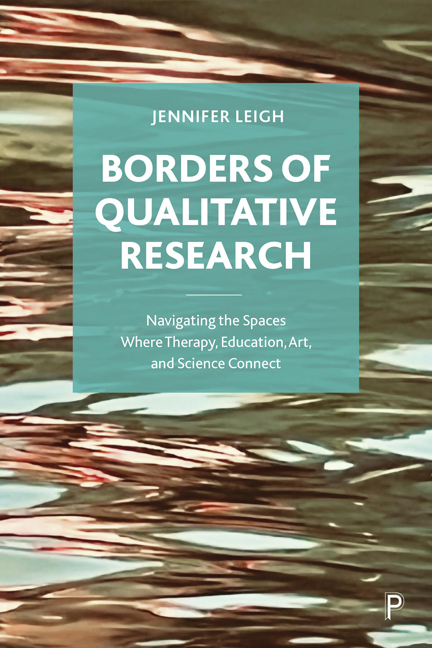 Borders of Qualitative Research
Borders of Qualitative Research Introduction to Part III
Published online by Cambridge University Press: 28 March 2024
Summary
Part III is comprised of four case studies in which I explicitly explore how my creative and embodied research bordered onto education, therapy, art, and science. Creative research may have more in common with a case study approach than interventions, which have been shown to be more suitable for in-depth, holistic research (Feagin et al 1991). Case study methodology is used to assess complicated phenomena within their contexts (Baxter and Jack 2008). Although my research is phenomenological, even phenomenology can be seen to be interventionist if an intervention is understood as implying an ‘intentional action to bring about an immediate and effective form of beneficial change’ (Edwards 2001: 3). Phenomenology may be seen ‘as psychotherapeutic in its potential to bring about a whole new lived world’, and of course, any research event ‘essentially constitutes a form of intervention’ (Edwards 2001: 3).
I have learned much through my research practice, and the case studies are intended to illustrate the ways in which different research projects have pushed towards the borders with art, education, science, and, most vitally, therapy. Those therapists who work in service to their clients (Rogers 1967) have a clear moral impetus, and the intent behind their interactions with their client is to help them. In contrast, researchers, artists, and educators may have many different and often conflicting intentions. The boundaries and guidelines of what they do and why are not always clear and transparent. For example, academics are driven to produce research outputs and research impact within a neoliberal climate that demands performance in a number of managerial metrics and a competitive job climate (Martin 2011; Fitzgerald et al 2012; Gray et al 2019). As such, there may be a tension between the desire to gather deep, rich, and emotionally honest data, and doing no harm to oneself or one’s participants. If we as researchers want to engage our participants with the levels of engagement and interaction that creative research methods allow us, then I believe it is important to learn from a therapeutic approach.
Therapeutic training focuses on building rapport, trust, and developing a relationship and relational field in which a client feels safe and supported to speak.
- Type
- Chapter
- Information
- Borders of Qualitative ResearchNavigating the Spaces Where Therapy, Education, Art, and Science Connect, pp. 137 - 138Publisher: Bristol University PressPrint publication year: 2023


